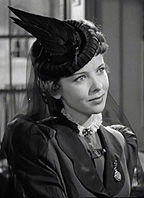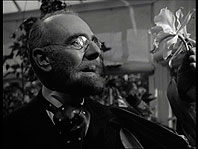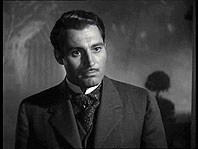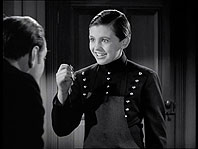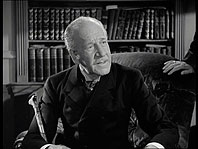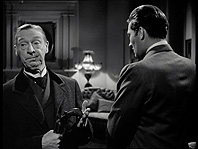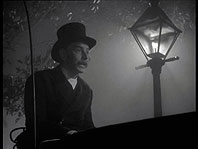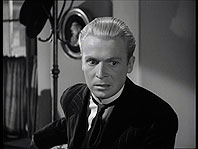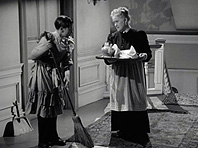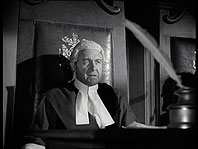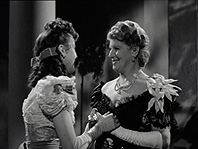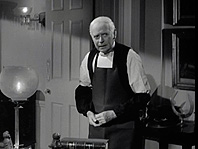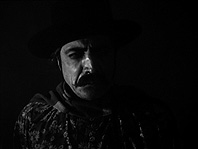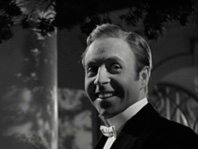» Sherlock Holmes Films » The Adventures of Sherlock Holmes
» The Hound of the Baskervilles
» Voice of Terror
» Sherlock Holmes and the Secret Weapon
» Sherlock Holmes in Washington
» Sherlock Holmes Faces Death
» The Spider Woman
» The Scarlet Claw
» The Pearl of Death
» The House of Fear
» The Woman in Green
» Pursuit to Algiers
» Terror by Night
» Sherlock Holmes and the Secret Code
Released: 1st September 1939
Release Order: 2 of 14
Release Order: 2 of 14
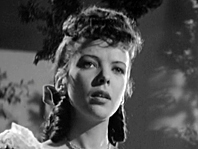
The Adventures of Sherlock Holmes
The Struggle of Super-Minds in the Crime of the Century!
The Adventures of Sherlock Holmes is the second and final 20th Century Fox production, the other being The Hound of the Baskervilles and it shares its sumptuous cinematography, lavish costumes, and fog-bound spooky sets. It's set in the late Victorian London of the original stories and its story revolves around Holmes' arch nemesis Professor Moriarty in a dastardly plot to steal the crown jewels from the Tower of London. The film is the longest and most slowly paced of the series, but there's lots going on with two parallel crimes.
Synopsis
¡Contains spoilers!
The film opens in court, with the judge acquitting Professor Moriarty for murder despite knowing he's guilty. Sherlock Holmes bursts into the courtroom with new evidence but it's too late to prevent Moriarty from escaping the noose. As they share a cab from the courtrooms, the professor promises Holmes that he will break him and “bring off the most incredible crime of the century”.
Moriarty returns home and immediately puts his plan to defeat Holmes into action. He instructs one of his minions, Bassick, to deliver a cryptic note and begin the elaborate plot. The professor means to distract Holmes with a lesser crime, and then commit his great crime right under his nose. Bassick delivers the note – a drawing of a man with a bird hanging around his neck – to a man called Lloyd Brandon.
Holmes is at his lodgings in Baker St., he's received a note from Ann Brandon (Lloyd's brother) asking his advice about whether to attend Lady Conyngham's garden party. Sir Ronald Ramsgate – constable of the Tower of London – arrives at 221b Baker St to ask for Holmes' help. Sir Ronald has received a threat that the soon-to-be delivered Star of Delhi will never reach the Tower, so he asks Holmes to help, and so he agrees to supervise the delivery.
Holmes and Dr. Watson are then called on by a very anxious Ann Brandon. Jerrold Hunter, Lloyd Brandon's lawyer and Ann Brandon's fiancé, insists that Ann goes to Lady Conyngham party but she doesn't want to go as she's scared for her life. She shows them the strange note that her brother Lloyd has received with the day's date on it, and it's identical to one received by her father just before his brutal murder ten years ago. Hunter then arrives at Holmes' rooms and demands that Ann return the note that she took from him, and also that Holmes doesn't interfere.
Naturally, Holmes does the opposite and decides to help Ann Brandon and “oh bother the Star of Delhi!”, so Miss Brandon accompanies Holmes to the Kensington Museum of Natural History. Meanwhile, Watson is checking up on Jerrold Hunter, and he discovers that his clientele includes Prof. Moriarty. In his office, Hunter tries to reassure Ann's brother that he's in no danger, and he sends him home.
At the museum, Holmes discovers that the bird in the note is an albatross and he immediately realises that the note is a warning of impending disaster. Watson abandons his shadowing of Jerrold Hunter and meets up with Holmes to tell him of the involvement of Moriarty, much to Holmes' annoyance as he wanted Watson to stay and find out more.
Jerrold Hunter knows that the danger to Lloyd is very real and so he follows Lloyd home, armed with a revolver. Unfortunately, he can not prevent the gruesome murder of Lloyd in a park opposite his home. Holmes, Watson, and a very distressed Ann Brandon discover Lloyd dead as they race back to her house. Watson looks after Ann while Holmes goes to talk to Inspector Bristol, who's already at the house, questioning Jerrold Hunter.
Bristol jumps to the conclusion that Hunter was responsible for the murder, but Holmes soon puts him straight, and highlights the fact that the victim was strangled and then had his skull crushed, postmortem. Nevertheless, Inspector Bristol wants to arrest Hunter, but Holmes persuades him to let Hunter go and then watch him instead. Holmes and Watson go to the park to investigate the scene of the crime, where Holmes finds a lucky chinchilla's foot, unusual footprints, and a broken tree branch. He deduces that Brandon was indeed killed by a weapon that both strangles the victim and crushes their skull. A curious weapon indeed.
Back inside the Brandon's house, Ann hears the haunting music coming from the street below, played by a street beggar. She screams and attracts the attention of Holmes and Watson, who come rushing to her aid. Holmes asks her to play the music on the piano, so he can attempt to identify it, then leaves with Watson so Ann can get some rest.
Back at 221b Baker Street, Holmes talks to his apprentice Billy about the case, much to Watson's chagrin, and Billy points out that the chinchilla's foot would likely have a South American owner. Holmes tells Watson that he's identified the music as an ancient Inca funeral dirge. Sir Ronald turns up at the door, to make sure that all is in place to supervise the delivery of the Star of Delhi, the next evening at 10 o'clock. Ann Brandon also comes to see Holmes, with a note identical to the one her brother received just before his murder. It has the next day's date on it; the same day as Lady Conyngham's party and the arrival of the Star of Delhi. Holmes tells Ann to attend the party, and perhaps “take a walk in the grounds” in an attempt to spring the trap, and asks Watson to take over his duty of guarding the Star of Delhi.
Moriarty gets the next part of his plan underway by shaving off his beard and disguising himself as a policeman. Bassick drives him to the Tower of London with two accomplices, also dressed as policemen. Holmes attends the garden party disguised as a music-hall entertainer, as he believes an attempt will be made on Ann's life. Meanwhile Watson is at the Tower to supervise the delivery of the Star of Delhi. Sir Ronald Ramsgate is underwhelmed that Holmes is absent but is reassured by Watson and the arrival of a police sergeant and two bobbies. Just as Sir Reginald is putting the jewel safely behind bars, the lights go out and in the ensuing chaos, Moriarty's men purloin the Star of Delhi whilst Moriarty himself slips into the cage with the rest of the Crown jewels. Moriarty's men drop the famous emerald, much to Sir Reginald's and Watson's relief.
Back at Lady Conyngham's, Ann decides to stay the night. She hears the Inca music again before the butler tells her that there's a gentleman outside who wants to see her - Ann assumes that it's Holmes and goes outside to discover that it's Jerrold Hunter, who she argues with and runs off into the grounds. The Inca music starts again, and on hearing her screams, Holmes and Watson come to her rescue. They capture her assailant, Gabriel Mateo, who is out for revenge on the Brandon family for the murder of his father, by their father in a dispute over ownership of their South American mine. His murder weapon was a bolas and Mateo reveals that it was Moriarty who urged him to seek revenge.
Holmes and Watson goes to Moriarty's home to look for clues to what he's up to. Holmes soon realises that Moriarty is using Mateo as a distraction from his true crime; to steal the Crown Jewels. Holmes and Watson rush to the Tower of London to prevent the crime, managing to crash the hansom cab at the gates. Holmes catches up with Moriarty in the Tower, and after an exchange of words and bullets, they struggle on the roof and Moriarty falls…ostensibly to his death.
The film ends with Watson reading the paper aloud to Holmes, telling him that Ann Brandon and Jerrold Hunter have got married. Watson then proceeds to squash a fly with the newspaper, a lot more effective method than Holmes' attempts to scare it away by plucking single notes on a violin.
Quotes
| Holmes: | You've a magnificent brain Moriarty, I admire it. I admire it so much, I'd like to present it pickled in alcohol to the London Medical Society. |
| Moriarty: | It would make an impressive exhibit. |
| Holmes: | I interfere whenever and wherever I like, Mr. Hunter. |
| Holmes: | Lady Conyngham is eminently respectable, but she gives the kind of parties that one comes away from with the feeling that one hasn't been anywhere. |
| Moriarty: | Through your neglect, this flower has died. You've murdered a flower…And to think for merely murdering a man I was incarcerated for six whole weeks in a filthy prison cell. |
| Passerby: | But aren't you ill? |
| Watson: | Certainly not. I'm dead! |
| Passerby: | Well, I'm afraid I must be getting on. |
| Watson: | Don't let me detain you. Stupid fellow. |
Director: Alfred L. Werker
Running Time: 85 minutes
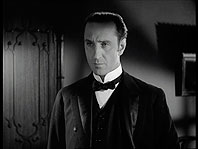
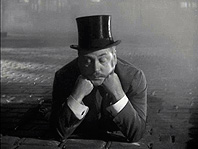
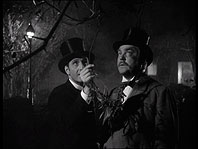
Running Time: 85 minutes



Favourite Quote
“There's death in every note”
– Ann Brandon
Favourite Character
Inspector Bristol
Miscellaneous
Lionel Atwill was originally cast as Prof. Moriarty, but was replaced before shooting by George Zucco.
William Gillette's name appears in the credits, but this film bears little or no resemblance to his 1899 play Sherlock Holmes.
Ida Lupino became the first woman to direct a film noir, The Hitch-Hiker (1953)
William Gillette's name appears in the credits, but this film bears little or no resemblance to his 1899 play Sherlock Holmes.
Ida Lupino became the first woman to direct a film noir, The Hitch-Hiker (1953)
Errors
Holmes' pipe disappears from one shot to the next as he sees Sir Ronald Ramsgate out the door.
Look Out For
Holmes' turn as a Music Hall entertainer, singing Oh I Do Like To Be Beside The Seaside.
The genuinely haunting music that plagues Ann Brandon.
Watson's annoyance at a passerby whilst playing dead in the street.
The genuinely haunting music that plagues Ann Brandon.
Watson's annoyance at a passerby whilst playing dead in the street.

